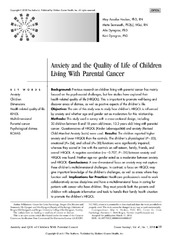| dc.contributor.author | Hauken, May | |
| dc.contributor.author | Senneseth, Mette | |
| dc.contributor.author | Dyregrov, Atle | |
| dc.contributor.author | Dyregrov, Kari | |
| dc.date.accessioned | 2019-05-20T17:06:31Z | |
| dc.date.available | 2019-05-20T17:06:31Z | |
| dc.date.issued | 2018-01 | |
| dc.Published | Hauken MAa, Senneseth M, Dyregrov A, Dyregrov K. Anxiety and the Quality of Life of Children Living with Parental Cancer . Cancer Nursing. 2018;41(1):E19-27 | eng |
| dc.identifier.issn | 0162-220X | |
| dc.identifier.issn | 1538-9804 | |
| dc.identifier.uri | https://hdl.handle.net/1956/19681 | |
| dc.description.abstract | Background: Previous research on children living with parental cancer has mainly focused on the psychosocial challenges, but few studies have explored their health-related quality of life (HRQOL). This is important to promote well-being and discover areas of distress, as well as positive aspects of the children’s life. Objective: The aim of this study was to study how children’s HRQOL is influenced by anxiety and whether age and gender act as moderators for this relationship. Methods: This study used a survey with a cross-sectional design, including 35 children between 8 and 18 years old (mean, 13.3 years old) living with parental cancer. Questionnaires of HRQOL (Kinder Lebensqualität) and anxiety (Revised Child Manifest Anxiety Scale) were used. Results: The children reported higher anxiety and lower HRQOL than the controls. The children’s physiological (P = .03), emotional (P = .04), and school (P = .00) functions were significantly impaired, whereas they scored in line with the controls on self-esteem, family, friends, and overall HRQOL. A negative correlation (r = −0.707, P < .01) between anxiety and HRQOL was found. Neither age nor gender acted as a moderator between anxiety and HRQOL. Conclusions: A one-dimensional focus on anxiety may not capture these children’s multidimensional challenges. In contrast, a focus on HRQOL may give important knowledge of the children’s challenges, as well as areas where they function well. Implications for Practice: Healthcare professionals need to work collaboratively across disciplines and have a multidimensional focus in caring for patients with cancer who have children. They must provide both the parents and children with adequate information and tools to handle their family health situation to promote the children’s HRQOL. | en_US |
| dc.language.iso | eng | eng |
| dc.publisher | Wolters Kluwer Health | eng |
| dc.rights | Attribution CC BY-NC-ND | eng |
| dc.rights.uri | http://creativecommons.org/licenses/by-nc-nd/4.0/ | eng |
| dc.subject | Anxiety | eng |
| dc.subject | Children | eng |
| dc.subject | Dimensions | eng |
| dc.subject | Health-related quality of life | eng |
| dc.subject | KINDL | eng |
| dc.subject | Multidimensional | eng |
| dc.subject | Parental cancer | eng |
| dc.subject | Psychological distress | eng |
| dc.subject | RCMAS | eng |
| dc.title | Anxiety and the Quality of Life of Children Living with Parental Cancer | eng |
| dc.type | Peer reviewed | |
| dc.type | Journal article | |
| dc.date.updated | 2019-03-07T12:15:25Z | |
| dc.description.version | publishedVersion | |
| dc.rights.holder | Copyright 2017 The Authors | eng |
| dc.identifier.doi | https://doi.org/10.1097/ncc.0000000000000467 | |
| dc.identifier.cristin | 1641133 | |
| dc.source.journal | Cancer Nursing | |

